Abbie Forbus is the Director of Teaching and Learning for KnowledgeWorks. She taught for 15 years in Lindsay Unified School District in California starting in K-2, then high school counselor and eventually became Dean of Culture. In her new position, Abbie works with learning communities across the country to coach them in redesigning learning structures toward personalized learning.
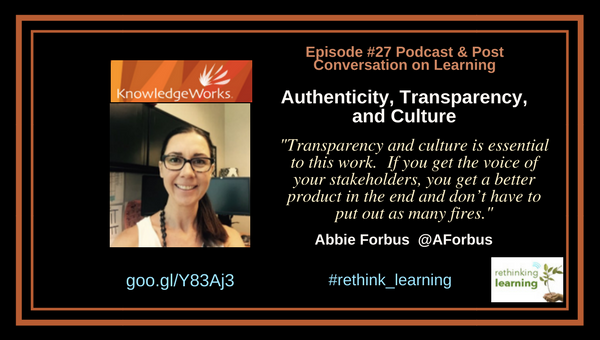
Podcast: Play in new window | Download
Subscribe: Spotify | TuneIn | RSS
I have participated in several convenings with KnowledgeWorks since 2009 and learned about Abbie who is Director of Teaching and Learning and the Back to School Toolkit. I was excited to have a conversation with her and even met her in person at iNACOL. Below are excerpts from the podcast.
I read that you worked with Lindsay USD for 15 years. Can you share your experiences there and what it meant to be the Dean of Culture?
I taught K-2, then became a high school counselor, and eventually Dean of Culture of Lindsay USD. Lindsay implemented the Performance-based System during my high school counselor role. I remember going through transcripts of incoming freshmen from their 8th grade year and encountered three transcripts in a row that had a 0.0 GPA. After starting PBS, where every learner was required to show mastery before being promoted, I was embarrassed about some of the things we had done in that traditional world…like a 9th grader failing English 9, then putting them in English 10 the next year…because they could take English 9 in their senior year when they had more room in their schedule.
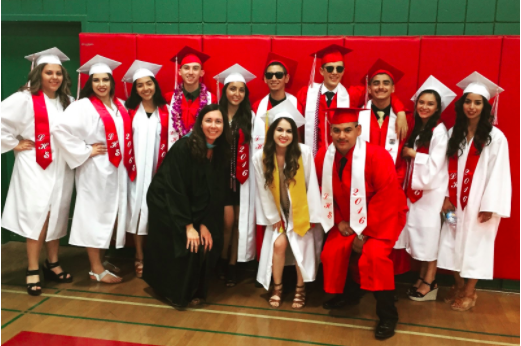
My former Kindergarten Students at their HS graduation (Lindsay HS)
Your role as Director of Teaching and Learning for KnowledgeWorks?
I get to work with various learning communities around the country that are working to create personalized, competency-based learning environments. At KnowledgeWorks, we are passionate about helping educators create learning environments that truly enable success for every student.
One of my favorite parts of this work is that we work with districts that are ready for this work, and we personalize it for them. Our teaching and learning team jokes sometimes about the idea of slide decks…since we tailor everything to the district, none of our professional developments are ever the same. We do a lot of research on our districts and get to know them really well which was one of my hopes coming into this job. I worked in a rural community for all those years and would love when we had visitors come to learn from us. I wanted to know what was happening “out there!” These districts we work with love their students and want to do what’s best for them.
We use what we call the 10 district conditions for scale, which are things like learning environments, data systems, instruction, student supports, learning environments, professional development, leadership development, curriculum, assessment systems, technology, and partnerships. We know that when a district transitions to Personalized, Competency-based Learning, you can’t just talk about curriculum in isolation, We help districts create a system-wide plan to achieving their vision, understand opportunities for growth and build capacity for sustainable alignment in all critical areas.
You had an integral part in developing the Back-to-School Toolkit from KnowledgeWorks. Can you share the toolkit?
This culture toolkit is something that should be used throughout the year. Culture is something that learning communities and environments have to re-establish every year, but we all know we don’t just work on culture in August. We’ve drawn on the experiences of school leaders: superintendents, principals, teacher leaders who have done this work of Personalized, Competency-based learning.
http://www.knowledgeworks.org/back-to-school-toolkit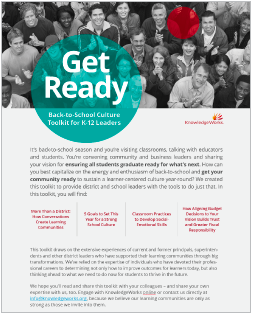
The toolkit starts with how conversations create learning communities that create authentic engagement especially with families and the broader learning community.
Authenticity—only ask if you really want to know. It’s more authentic. If you plan a parent meeting and no one shows up, you can’t just say, “Well, I tried.” Parents want to have a voice, they just aren’t used to being heard. And they are busy people so you have to work around their schedules which sometimes is really inconvenient…but I think you will find is a worthwhile investment.
Transparency and culture are essential to this work. The importance of transparency and stakeholder voice was something I learned in Lindsay. I had this instinct to just do things myself, but I learned that if you stop to get the voice of your stakeholders, you get a better product in the end and don’t have to put out as many fires.
Examples of Districts working with KnowledgeWorks
The districts that we work with that have the greatest success have a vision that is aligned to the needs and desires of the communities they serve.
We work with Garfield 16 SD in Colorado that received some parent feedback about lack of communication. They surveyed parents on how they wanted to receive communication and told the parents the results developing a communication plan around that. That’s transparency at its best! Community partners sometimes get put on the back burner because it can be very time-consuming to involve the community.
Marysville, OH is one of the districts we work with in 2013, Diane Mankins’ first acts were to hold more than 20 community meetings that were open to parents, educators, community leaders and stakeholders. She had two questions for attendees: What are you most proud of in our schools? And if you could wave a magic wand and change one thing, what would it be? Realized arrows were pointing in different directions.
Marysville Case Study:
http://www.knowledgeworks.org/sites/default/files/u1/case-study-marysville-district.pdf
“Prior to opening the early college, when I thought about community partnerships I thought if the local lumberyard could build me a picnic table, that was a partnership, But what I’ve learned, and what I truly believe, is that the partnerships have to be beneficial for the school and the partner.”
Kathy McKinnis, principal Marysville Early College HS
The community was concerned about:
- retirement age,
- workforce development needs, and
- ensuring that Marysville graduates had a reason – and the desire – to stay in the community.
Because they involved the community from the beginning, they now have strong partnerships and a phenomenal workforce development program that meetings the unique needs of their community.
Goals to set a Strong School Culture
Create a culture of transparency
As administrators and leaders, we have to set the same expectations for transparency as we expect teachers to set with students.
- What do the learners think about this?
- What does the staff think?
- Go to your critics? Why will this work or not work?
Live your vision to support all learners
The vision of RSU2 in Maine is to be a system of student-centered learning. It’s not just a poster that hangs in the district office or is put on letterhead…everything they do is tied back to their vision.
Other projects at KnowledgeWorks
We are doing some really cool work with learning continuums right now that I am excited about. We believe that having a transparent guaranteed and viable curriculum creates opportunities for student agency. It’s critical to creating an environment where all students can succeed. We don’t do that process for districts, we believe districts already have the knowledge and expertise needed to do the work, we just facilitate the process, which of course is customized to the needs of the district.
Also, one of my favorite parts about working at KnowledgeWorks are the incredible resources and teams that I have access to. There is a team of education policy experts that advocate for legislation and policy that supports local innovation and meeting the needs of every child.
And my absolute favorite team is our future forecasters that research and analyze drivers of change to help us look ahead to the future of learning and work, so we can take action today to better prepare students. Their recent piece on The Future of Learning called: Redefining Readiness from the Inside Out, blew my mind…completely reaffirms the Why for the work we are doing with Personalized competency-based education.
Future Forecast Paper: http://www.knowledgeworks.org/redefining-readiness
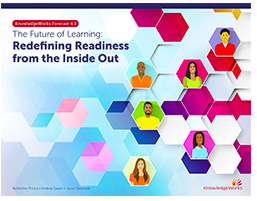
In it, they talk about the signals of change that point to a decline in full-time employment… which will lead to employees piecing together career mosaics..
Because they are piecing together jobs, the future workforce will need to be highly relations, hence the need for SEL…They need the knowledge, skills and dispositions to be able to do that!
*****
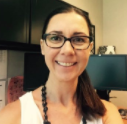 As a Director of Teaching and Learning for KnowledgeWorks, Abbie Forbus works with learning communities across the country to coach them in redesigning learning structures toward personalized learning. Prior to joining KnowledgeWorks, Forbus spent 15 years working with learners in Lindsay Unified School District, a competency-based learning community in rural Lindsay, CA. She served as a K-2 learning facilitator, high school counselor, and Dean of Culture.
As a Director of Teaching and Learning for KnowledgeWorks, Abbie Forbus works with learning communities across the country to coach them in redesigning learning structures toward personalized learning. Prior to joining KnowledgeWorks, Forbus spent 15 years working with learners in Lindsay Unified School District, a competency-based learning community in rural Lindsay, CA. She served as a K-2 learning facilitator, high school counselor, and Dean of Culture.
Abbie received a Bachelors in Elementary Education from Miami University, with a concentration in the Spanish Language, and a Masters in School Counseling from National University.
Twitter: @AForbus
Articles by Abbie under World of Learning on KnowledgeWorks
- Are You Listening to Students?
- A Bell Schedule Without Bells: Redesigning the High School Infrastructure
- Building Culture Through Social-Emotional Learning
- Encouragers and Inhibitors of Personalized Learning According to Teachers of the Year
- The Current and Desired States of Personalized Learning According to Teachers of the Year
*****
For all of the Rethinking Learning podcasts with Barbara Bray, click on the podcast tab at the top, the logo below, or go to https://barbarabray.net/podcasts/
Go to this page for resources, questions, and more information about Barbara’s new book, Define Your WHY.




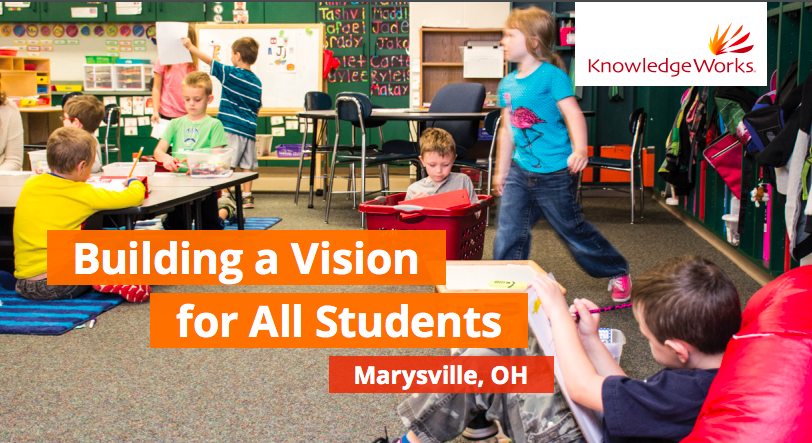




[…] Abbie Forbus is the Director of Teaching and Learning for KnowledgeWorks. She taught for 15 years in Lindsay Unified School District in California starting in K-2, then high school counselor and eventually became Dean of Culture. In her new position, Abbie works with learning communities across the country to coach them in redesigning learning structures …Read More […]